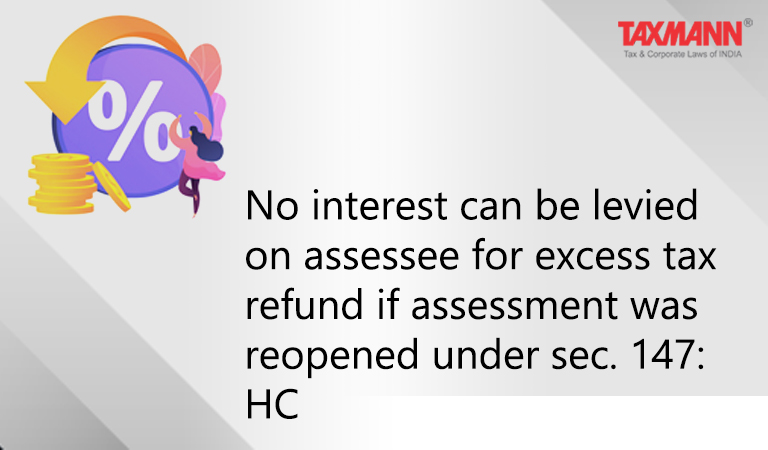No interest can be levied on assessee for excess tax refund if assessment was reopened under sec. 147: HC
- Blog|News|Income Tax|
- 2 Min Read
- By Taxmann
- |
- Last Updated on 17 September, 2021

Case details: CIT v. United India Insurance Co. Ltd - [2021] 130 taxmann.com 251 (Madras)
Judiciary and Counsel Details
-
- T.S. Sivagnanam and Sathi Kumar Sukumara Kurup, JJ.
- T. Ravikumar, Sr. Standing Counsel for the Appellant.
- M.V. Swaroop and Ms. Madhunika Varadarajan for the Respondent.
Facts of the Case
Assessee-United India Insurance Company Ltd., filed its return of income declaring a total loss. Assessment was completed under Section 143(3). Subsequently, notice was issued under Section 148 and reassessment was completed.
Assessee preferred before the CIT(A) challenging the levy of interest under Section 234D. The CIT(A) allowed appeal of assessee which was further upheld by Tribunal. Aggrieved-revenue filed the instant appeal before the Madras High Court.
High Court Held
The Madras High Court held that Section 234D provides that if any refund is granted to assessee and no refund is due on regular assessment or amount refunded exceeds amount refundable on regular assessment then assessee shall be liable to pay simple interest on such excess refund.
Further, Explanation (1) in Section 234D states that where, in relation to an assessment year, an assessment is made for the first time under Section 147 or Section 153A, the assessment so made shall be regarded as a regular assessment for the purposes of Section 234D.
The issue before the Court was whether the reassessment completed in the assessee’s case can be regarded as assessment made for the first time under Section 147 and thus, can it be regarded as a ‘regular assessment’.
The Court held that the ‘regular assessment’ has been defined under Section 2(40) to mean the assessment made under Section 143(3) or Section 144. In the instant case, the assessment was completed under section 143(3) and subsequently reassessment was made under section 147.
Thus, it was clear from the fact that re-assessment proceedings under Section 147 after completion of the assessment under Section 143(3) is to be excluded from the purview of regular assessment.
Further, taking note of the definition of regular assessment, the assessment under section 147 having not been made for the first time, but after the completion of the assessment under Section 143(3), thus, same couldn’t be termed as “regular assessment”. Consequently, the provisions of Section 234D couldn’t be applied to the assessee’s case.
Disclaimer: The content/information published on the website is only for general information of the user and shall not be construed as legal advice. While the Taxmann has exercised reasonable efforts to ensure the veracity of information/content published, Taxmann shall be under no liability in any manner whatsoever for incorrect information, if any.

Taxmann Publications has a dedicated in-house Research & Editorial Team. This team consists of a team of Chartered Accountants, Company Secretaries, and Lawyers. This team works under the guidance and supervision of editor-in-chief Mr Rakesh Bhargava.
The Research and Editorial Team is responsible for developing reliable and accurate content for the readers. The team follows the six-sigma approach to achieve the benchmark of zero error in its publications and research platforms. The team ensures that the following publication guidelines are thoroughly followed while developing the content:
- The statutory material is obtained only from the authorized and reliable sources
- All the latest developments in the judicial and legislative fields are covered
- Prepare the analytical write-ups on current, controversial, and important issues to help the readers to understand the concept and its implications
- Every content published by Taxmann is complete, accurate and lucid
- All evidence-based statements are supported with proper reference to Section, Circular No., Notification No. or citations
- The golden rules of grammar, style and consistency are thoroughly followed
- Font and size that’s easy to read and remain consistent across all imprint and digital publications are applied



 CA | CS | CMA
CA | CS | CMA
